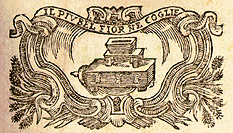
1716, Naples: FRANCESCO LAINO
Three quarters of a century separate the last edition of the Comedy
to be published in the 17th century and the first to be published in the
18th (Verona, 1702). The second edition to be published in the 18th century
is presented here. It reproduces the Crusca
Academy text of 1595, and thus represents
the continuation of the 16th-century textual tradition in an altered cultural
environment.
Dante becomes for the first time an object of attention for the kind of
erudite scholarship which characterizes much of early 18th-century culture
in Italy. Thus Dante is inscribed in the literary histories composed during
the early years of the century by Muratori, Crescimbeni, Quadrio and Tiraboschi
among others, as a figure standing at the origins of an Italian national
literature. This historical recovery of Dante as a founder of Italian literature
helped to attenuate the harsh judgements which were otherwise typical of
both neo-classical and baroque responses to the poet.
Another response to 18th-century neo-classical disdain for Dante was to
characterize the primitive qualities of his writings as strengths and not
weaknesses. Giambattista Vico (1668-1774), author of Principi di una
scienza nuova (The New Science, 1725 and 1730) is the most famous
proponent of this view. Vico viewed Dante as another Homer and Dante's Middle
Ages as a "barbarous" time comparable to the time of ancient Greece,
where the imagination and the heroic spirit prevailed: "The Comedy
of Dante is to be read on three counts: as a history of barbaric times in
Italy, as the source of very beautiful Tuscan ways of speaking, and as an
example of sublime poetry."
But while Dante had become worthy of attention and sometimes admiration
during the early 18th century, he was not yet considered central enough
to the concerns of 18th-century criticism to merit sustained attention.
Nevertheless, it was in the 18th century that the seeds of future critical
developments were sown, especially in the new awareness of Dante as the
founding poet of an Italian nation, and in a new appreciation for the sublime
power of his poetic inspiration. The latter would eventually bring Dante
to the foreground during the Romantic period.

